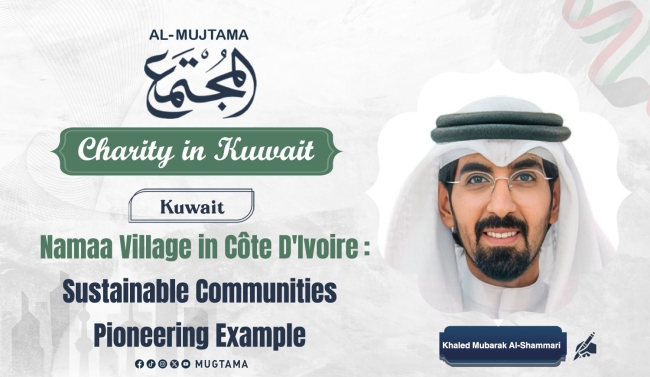Namaa Village in Côte D'Ivoire: Sustainable Communities Pioneering Example Featured
The Nama Charity Village, established by the Kuwaiti Nama Charity Association in the Kési region of central Côte d'Ivoire, is a comprehensive model for achieving sustainable development. It provides housing for the poor, a school, a mosque, and a water well, contributing to meeting the basic educational, religious, health, and economic needs of the local community.
This developmental project reflects the association's commitment to enhancing the dignified life of the most vulnerable groups and establishing a sustainable living environment that enables them to achieve stability and engage in improving their quality of life.
Houses for the Poor: A Dignified and Inclusive Life
The houses in the Nama Charity Village serve as a radical solution for the residents of the area, who were previously living in makeshift huts that lacked the simplest elements of human life. These houses have helped reunite families, as some were living in scattered locations due to the lack of suitable housing.
The new homes are not just shelters; they represent an opportunity for low-income families to live with dignity, safety, and stability, away from the struggles of homelessness. These homes were designed in collaboration with certified engineering offices to ensure a strong, safe infrastructure that considers the area's characteristics and meets the basic needs of residents, thus preserving their human dignity.
Education as the Gateway to the Future
Education is the cornerstone of building sustainable communities. Therefore, the Nama Association made it a priority to establish a school in the heart of the village. The school provides an opportunity for children from needy families to receive basic education, contributing to the development of a generation capable of achieving personal and community advancement. The school also provides a learning environment that encompasses various educational levels, opening new horizons for children to learn and develop skills, enhancing their opportunities for the future. Education is a fundamental aspect of sustainable development, as it helps break the cycle of poverty and creates better economic opportunities for future generations.
The Spirit of the Community and a Gathering Point
The mosque in the Nama Village is not merely a place of worship; it is also a center that unites community members, fostering social ties among the village residents. It enables them to perform communal worship, reinforces values of cooperation and peace, and provides a space for exchanging news and offering social support among community members. The mosque enhances spirituality and harmony in the village, reflecting the importance of the religious aspect in the lives of its inhabitants and contributing to creating an integrated and interconnected community based on Islamic values that encourage cooperation and support.
The Water Well: Sustainable Life and Health
One of the main challenges facing the residents of Kési and Côte d'Ivoire in general is the scarcity of clean water, which is essential for public health. Therefore, a well was dug in the Nama Village to provide clean drinking water, helping to reduce the spread of diseases linked to contaminated water and alleviating the burden of traveling to distant areas to fetch water. The water well is a source of life for the village residents, contributing to enhancing their health and stability. It is a vital factor in improving the quality of daily life and achieving sustainability in providing one of the most essential resources.
The Importance of Namah Village: A Model for Sustainable Development
Namah Charitable Village in Côte d'Ivoire represents a model of sustainable humanitarian work, where the association's efforts focus on comprehensively meeting the needs of the village's inhabitants, enhancing their ability to be self-reliant, and achieving their human dignity. The association aims to improve the quality of life in Kessy by providing integrated solutions that include education, health, water, and housing; contributing to the stability of families and providing a nurturing environment for children that allows them to grow and learn away from the burdens of harsh life.
Supporting Comprehensive Development in Côte d'Ivoire
The Namah Village project in Côte d'Ivoire aligns with the strategic vision of the Namah Charitable Association, which focuses on developing impoverished communities through sustainable programs that establish a strong infrastructure contributing to the stability of living conditions. The project also contributes to achieving the Sustainable Development Goals for Côte d'Ivoire by providing opportunities for education, health, and housing, which reduces poverty and enhances prosperity. Additionally, the association is keen on employing local labor in construction projects, supporting the local economy, creating new job opportunities, and benefiting the residents of the village and the surrounding area.
The Success of the Project: A Triad of Mission, Need, and Support
The success of the Namah Charitable Village project is based on three essential elements: mission, need, and support. The project's mission is clear in its aim to build a community that is more dignified and empowered, responding to the genuine needs of poor families, alongside the generous support from Kuwaiti donors, who believe in the importance of the project and its humanitarian message. This success demonstrates that charitable projects can be more than just providing immediate assistance; they can achieve sustainable impact by improving living conditions and providing a suitable environment for growth and development.
Namah Charitable Village in Côte d'Ivoire is one of the pioneering projects that reflect a comprehensive vision of Kuwaiti charitable work; it is not merely a residential village but an inclusive community that provides people with their most basic rights to live in dignity. The village highlights the importance of international cooperation and solidarity among peoples, offering a lesson on how to build communities based on humanity and inclusiveness. It proves that charitable work can bring about real change in the lives of those in need, enhancing their stability and establishing a strong foundation for a sustainable future.


